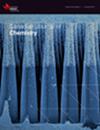Solar Cell of Sb2O3:CuO/Si Prepared Via Thermal Evaporation Technique: Structural, Morphological Properties, and Efficiency
IF 1
4区 化学
Q3 CHEMISTRY, MULTIDISCIPLINARY
引用次数: 0
Abstract
Antimonous oxide (Sb2O3) has intriguing physical and chemical features that make it useful in various device applications, including solar cells. Nanofilms of Sb2O3:0.02wt.% CuO were prepared onto glass and silicon substrates etched by laser using a thermal evaporation process in a vacuum, with different thicknesses of about (20, 30, and 40 nm). The deposited nanofilms have no distinguishing peaks in XRD analysis. The broadening of the peak shows due to the absence of long-range symmetry as a result, the nanocrystalline structure is disorganized. SEM analysis of the surface morphology of the formed nanofilms showed spread out uniformly and were devoid of islands and voids. The particles were all about the same size, and the new structures were created with a thickness of 40 nm. AFM scanning images showed the nanofilms' homogeneous surface morphology with granular shape. As nanofilm thickness increased, so was average roughness, root mean square value and grain diameter. Optical characteristics revealed a reduction in the transmittance spectrum with increasing thicknesses. Instead, the optical energy gap (E_g^opt) was decreased by quantum confinement from 3.56 to 3.48 eV. The electrical properties of the nanofilms were analyzed, and it was found that all were n-type and that mobility (µ) decreased with nanofilm thickness. As shown by the I-V characteristics, the solar cell's conversion efficiency increases to (6.373%) at power = 100 mW/cm2 with (0.138) filling factor, (4V) of open circuit voltage, and (2.6 mA) of short circuit.热蒸发法制备Sb2O3:CuO/Si太阳能电池:结构、形态及效率
氧化锑(Sb2O3)具有有趣的物理和化学特性,使其在各种设备应用中非常有用,包括太阳能电池。Sb2O3:0.02wt的纳米膜。采用真空热蒸发工艺在激光蚀刻的玻璃和硅基板上制备了不同厚度的CuO,厚度分别为20nm、30nm和40nm。所制备的纳米膜在XRD分析中没有明显的特征峰。峰的展宽是由于缺乏长程对称性,导致纳米晶体结构紊乱。对纳米膜表面形貌的扫描电镜分析表明,纳米膜均匀分布,没有孤岛和空洞。这些颗粒的大小都差不多,新结构的厚度为40纳米。AFM扫描图像显示纳米膜表面形貌均匀,呈颗粒状。随着纳米膜厚度的增加,平均粗糙度、均方根值和晶粒直径也随之增加。光学特性显示透射光谱随厚度的增加而减小。相反,量子约束使光能隙(E_g^opt)从3.56 eV减小到3.48 eV。对纳米膜的电学性质进行了分析,发现纳米膜均为n型,迁移率(µ)随纳米膜厚度的增加而降低。由I-V特性可知,在功率= 100 mW/cm2、填充系数为0.138、开路电压为4V、短路电压为2.6 mA时,太阳能电池的转换效率提高到6.373%。
本文章由计算机程序翻译,如有差异,请以英文原文为准。
求助全文
约1分钟内获得全文
求助全文
来源期刊

Canadian Journal of Chemistry
化学-化学综合
CiteScore
1.90
自引率
9.10%
发文量
99
审稿时长
1 months
期刊介绍:
Published since 1929, the Canadian Journal of Chemistry reports current research findings in all branches of chemistry. It includes the traditional areas of analytical, inorganic, organic, and physical-theoretical chemistry and newer interdisciplinary areas such as materials science, spectroscopy, chemical physics, and biological, medicinal and environmental chemistry. Articles describing original research are welcomed.
 求助内容:
求助内容: 应助结果提醒方式:
应助结果提醒方式:


